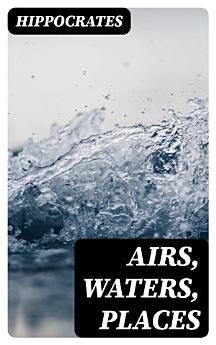Airs, Waters, Places
Hippocrates
Nov. 2022 · DigiCat
E-boek
23
Bladsye
family_home
Geskik
info
reportGraderings en resensies word nie geverifieer nie. Kom meer te wete
Meer oor hierdie e-boek
In "Airs, Waters, Places," Hippocrates presents a pioneering treatise on the environmental factors influencing human health, blending observational inquiry with early medical thought. The work is characterized by its empirical approach, examining how varying climates, waters, and geographies affect the health of individuals and communities. This text stands as a seminal piece in the canon of medical literature, revealing the interconnectedness of environment and well-being, while foreshadowing later developments in epidemiology and public health. Hippocrates' style is methodical and persuasive, appealing to both rational thought and empirical observation, making it a foundational text in the medical tradition. Hippocrates, known as the 'Father of Medicine,' was a pivotal figure in shifting medical practices from mystical explanations to rational theories. Living in ancient Greece around the 5th century BCE, Hippocrates was influenced by a rich intellectual tradition and the Socratic method of inquiry. His desire to understand the human body and its ailments was propelled not only by personal curiosity but also by the practical need to treat patients in a more effective manner, reflecting the ethos of his time. This compelling work is highly recommended for readers interested in the historical roots of medicine and the continuing relevance of environmental health. "Airs, Waters, Places" offers profound insights and lays the groundwork for understanding health in the context of geography and climate—concepts that are increasingly pertinent in today's world.
Meer oor die skrywer
Hippocrates, often revered as the 'Father of Western Medicine,' was a seminal figure in the development of medical practice and philosophy in the classical world. Born on the Greek island of Kos around 460 BCE, he became the most celebrated physician of his time. Although direct historical records from his life are scarce, his contributions have left an indelible mark on the field of medicine. A noteworthy work attributed to Hippocrates is 'Airs, Waters, Places,' which examines environmental and lifestyle factors in relation to health and disease, proposing that one's surroundings can influence their well-being. This text is instrumental in the shift of medicine from a more superstitious practice to one predicated on observation and logical reasoning. Hippocratic thought was dominated by a belief in the natural healing process of rest, diet, exercise, and fresh air. As the reputed author of the Hippocratic Corpus, a collection of around 70 medical works of varying authenticity, his influence extends to the eponymous Hippocratic Oath, an ethical framework still in use today. Scholarly debate continues on the exact writings by Hippocrates, as many of the texts within the Corpus are considered to be the work of his followers and later interpreters who codified his teachings and practices. Despite this, Hippocrates' standing as a key historical figure in the transition to systematic and rational medical practice remains uncontested.
Gradeer hierdie e-boek
Sê vir ons wat jy dink.
Lees inligting
Slimfone en tablette
Installeer die Google Play Boeke-app vir Android en iPad/iPhone. Dit sinkroniseer outomaties met jou rekening en maak dit vir jou moontlik om aanlyn of vanlyn te lees waar jy ook al is.
Skootrekenaars en rekenaars
Jy kan jou rekenaar se webblaaier gebruik om na oudioboeke wat jy op Google Play gekoop het, te luister.
E-lesers en ander toestelle
Om op e-inktoestelle soos Kobo-e-lesers te lees, moet jy ’n lêer aflaai en dit na jou toestel toe oordra. Volg die gedetailleerde hulpsentrumaanwysings om die lêers na ondersteunde e-lesers toe oor te dra.








